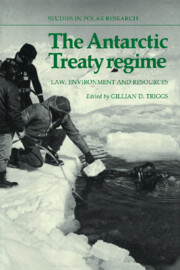Book contents
- Frontmatter
- Contents
- List of contributors
- List of Antarctic Treaty Parties
- Foreword
- Introduction
- Frontispiece: Map of national claims
- Part I Antarctica: physical environment and scientific research
- Part II The Antarctic Treaty regime: legal issues
- Part III The Antarctic Treaty regime: protecting the marine environment
- Part IV The Antarctic Treaty regime: minerals regulation
- Part V Whither Antarctica? Future policies
- 18 Introduction
- 19 Current and future problems arising from activities in the Antarctic
- 20 Antarctica: the claims of ‘expertise’ versus ‘interest’
- 21 Whither Antarctica? Alternative strategies
- Part VI Conclusion
- Selected reading
- Appendix 1
- Appendix 2
20 - Antarctica: the claims of ‘expertise’ versus ‘interest’
Published online by Cambridge University Press: 20 January 2010
- Frontmatter
- Contents
- List of contributors
- List of Antarctic Treaty Parties
- Foreword
- Introduction
- Frontispiece: Map of national claims
- Part I Antarctica: physical environment and scientific research
- Part II The Antarctic Treaty regime: legal issues
- Part III The Antarctic Treaty regime: protecting the marine environment
- Part IV The Antarctic Treaty regime: minerals regulation
- Part V Whither Antarctica? Future policies
- 18 Introduction
- 19 Current and future problems arising from activities in the Antarctic
- 20 Antarctica: the claims of ‘expertise’ versus ‘interest’
- 21 Whither Antarctica? Alternative strategies
- Part VI Conclusion
- Selected reading
- Appendix 1
- Appendix 2
Summary
‘Realities’ in dealing with Antarctica
Central to all considerations of Antarctica is the fact that there is no agreement on the issue of sovereignty. But it could also be said that except inter se the seven claimant states (and leaving aside the matter of overlapping claims), all other states do not recognize these claims. There is also a large unclaimed sector. In addition, two states assert they have a ‘basis of claim’. Thus, in relation to the sovereignty issue, there is the reality of the claims, on which the claimant states are insistent; there is also the reality that these claims are not recognised by an overwhelming majority of states.
There are other realities which include the following:
i) the Antarctic Treaty has existed since 1959 and today has 32 signatory states; a number of conventions and agreements have evolved within the framework of the Treaty dealing with various activities in Antarctica; the parties to the Antarctic Treaty System (ATS) are anxious that its achievements which are based on the fragile agreement of Article IV of the Treaty, should not be prejudiced;
ii) Antarctica is not a minute atoll of no significance but it occupies some l/10th of the surface of the globe with a strategic location, fragile ecosystem, rich marine and, possibly, mineral resources; it therefore has great significance for international peace and security, economy, environment, scientific research, meteorology, telecommunications and so on; it also has no permanent human habitation;
[…]
- Type
- Chapter
- Information
- The Antarctic Treaty RegimeLaw, Environment and Resources, pp. 211 - 217Publisher: Cambridge University PressPrint publication year: 1987

